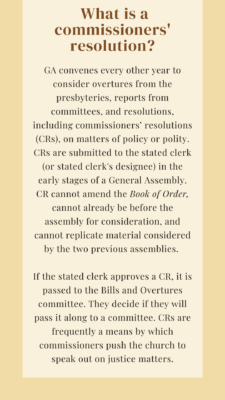
Salt Lake City – The Presbyterian Foundation and the Board of Pensions, the two primary investing arms of the Presbyterian Church (U.S.A.), have been asked to “prayerfully consider” ending their investments in government debt from countries “engaged in prolonged military occupation,” currently defined by the United Nations as Israel, Morocco and Turkey.
Meeting in Salt Lake City, commissioners to the 226th General Assembly unanimously adopted the recommendation on Monday, July 1.
 “I’m praising God for the General Assembly’s resounding approval of a commissioner’s resolution, developed with colleagues in the Israel/Palestine Mission Network, that calls on our church to divest from bonds in Israel and two other countries that are engaging in prolonged military occupation,” said Hunter Farrell, a teaching elder commissioner from the Pittsburgh Presbytery.
“I’m praising God for the General Assembly’s resounding approval of a commissioner’s resolution, developed with colleagues in the Israel/Palestine Mission Network, that calls on our church to divest from bonds in Israel and two other countries that are engaging in prolonged military occupation,” said Hunter Farrell, a teaching elder commissioner from the Pittsburgh Presbytery.
Farrell is one of two commissioners who co-authored the commissioner’s resolution (CR), “Divest from Governmental Debt Held by Countries Maintaining a Prolonged Military Occupation.” A CR is the only mechanism for the elected commissioners to bring business before the assembly. Anne Weirich, a teaching elder commissioner from the Presbytery of Southern New England, was the other co-author.
“While our church’s Mission Responsibility Through Investment (MRTI) has done laudable work to ensure our pension and (Presbyterian) Foundation funds support only corporations doing work that aligns with our values, we discovered that our church also invests in regimes of occupation,” said Farrell. The assembly acted to end that support today,” said Farrell, former director of Presbyterian World Mission.
“We discovered that our church also invests in regimes of occupation…” — Hunter Farrell
The Presbyterian Foundation and the Board of Pensions collectively hold about $1.1 million in government debt from those countries.
“Through its regular processes, MRTI could add this type of debt to their divestment list as soon as this fall, after which the investing agencies could present the recommendations to their boards for action,” said Presbyterian Foundation President and CEO Tom Taylor. Divesting could then begin as soon as early 2025.
A key part of the recommendation was to ask MRTI to develop a “mechanism to establish and maintain the list of countries” that would be affected.
“After that, the MRTI task force can examine sovereign debt issued by countries in a prolonged military occupation and develop a policy on it,” Taylor said.
Farrell added, “We, as church, are saying to them, ‘We see you, we hear your cries, and we are doing everything within our power to respond.’ Divesting from bonds is also an expression of love toward our siblings and mission partners who are occupiers,” Farrell said. “We, as church, are saying to them, ‘We see you, we hear you, and as a church that is historically rooted in our own sins of racism and territorial theft, we understand that oppressors need to be liberated, too, from the harm that their actions are causing.’”
The assembly also unanimously approved FIN-01, directing MRTI to begin “focused engagement” with GE and Palantir Technologies Inc. because of their involvement in providing military equipment to Israel, China, Saudi Arabia, Yemen and asylum seekers, taking the first step in a process that could lead to an eventual recommendation the church divest its holdings in those companies.
In a related item, commissioners voted to approve MRTI’s request to create an 11-member task force to review the church’s divestment strategy, which dates to 1984. The task force is to report to the 227th General Assembly meeting in Milwaukee, Wisconsin.
Also approved was FIN-03, MRTI’s request to remove HP Inc. from the divestment list due to corporate organizational changes that isolated non-military production.






